The MV Isle of Islay, the first of four vessels to be built for CalMac in Turkey, was launched today at Cemre Marin Endustri shipyard.
Representatives of CMAL and key project stakeholders were in attendance, and Morag McNeill, Chair of CMAL, officially launched the ferry.
Scheduled for delivery in October 2024, the vessel will have capacity for up to 450 passengers and 100 cars, or 14 commercial vehicles. It will provide a combined 40% increase in vehicle and freight capacity on the Islay routes, bolstering the overall resilience of the wider fleet.
“Work will continue onboard the vessel while it is in the water, before it undergoes sea trials and is handed over to owners, CMAL. Crew familiarisation and local operational trials will then take place upon her arrival from Turkey, before the MV Isle of Islay enters service. An official naming ceremony will take place on Islay towards the end of the year, where community representatives and stakeholders will be invited to board and tour the vessel to celebrate its arrival before it officially joins the fleet.”
Kevin Hobbs, Chief Executive Officer at CMAL, said:
“The successful launch of the MV Isle of Islay marks a major milestone in the vessel’s construction. It’s wonderful to see her in the water. We look forward to marking the official naming of the ferry, MV Isle of Islay, at the event later this year as we welcome her to Scottish waters.”
Fiona Hyslop, Cabinet Secretary for Transport, said:
“I’m delighted to see MV Isle of Islay enter the water and look forward to her arrival in Scotland later this year. I know she will be warmly welcomed by the communities she will serve. This is another important milestone reached in the Scottish Government’s commitment to deliver six new major vessels to serve the Clyde and Hebrides network by 2026. With MV Isle of Islay progressing towards delivery in October, and her sister ship MV Loch Indaal following soon after, ferry users can anticipate more reliable and resilient services with increased capacity for the Islay routes from 2025. I look forward to seeing these and more new vessels being added to the fleet in the coming years and bringing improvements for island communities across the Clyde and Hebrides network.”
Robbie Drummond, Chief Executive of CalMac, said:
“We are very much looking forward to welcoming MV Isle of Islay into our fleet. When she enters service, she will deliver a real step change in resilience and capacity for the community of Islay enabling future growth.”
The second vessel for Islay and Jura is due to be launched at Cemre later this year.



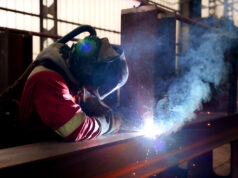
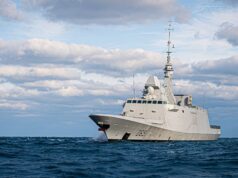

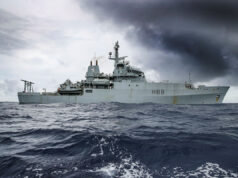
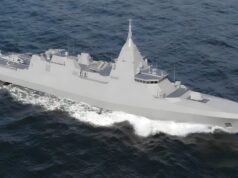
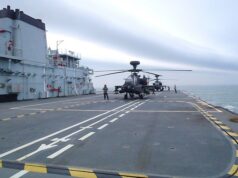

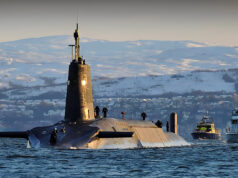
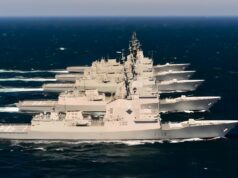

Sad that our ship building industry is so broken, as an island nation we need lots of ships..boat/ship building should be one heavy industry that we do naturally as part of our nations security.
ship building should be protected and grown…not allowed to die on the alter of neoliberalism….that is what has allowed china to have over 50% of the worlds shipbuilding capabilities and create a profound security risk for western democracies ( china can now build 240 times more tonnage than the U.S. because of the wests slavish following of neoliberalism..no matter the security and geopolitical cost).
Are you not able to get a critique of how neoliberal dogma has impacted on critical industrial capacity…or do you just say “are you a troll” if you don’t understand or agree with a comment..ironic as that’s the classic example of a “troll”.
are you a Russian troll? Hands down you win stupid post of the day award and are in the running for the week award.
No U.K. yards even bid for these ferries. Some kind of balance between having capability and wasting money needs to be found.
I get visions of 1960/70s shipyards being kept on to this day with unions and 1000s of staff to build the occasional Bessel.
-a National shipbuilding strategy is there and roughly it’s known what ships are required at what timescales. So ideally with proper planning there is enough constant work for civilian vessels long term.
That may require paying more to a government yard but with the money spent in the U.K. economy it all works out. I’ve read various stats from 15-50% more upfront cost still works out cheaper than sending the work abroad.
Indeed it’s always a bit difficult as without competition you can get poor practice but with globalisation competition becomes international and therefore moves into the domain of geopolitical advantage and can be weaponised as part of geostrategic goals, which is what china has done with the shipping industry. I’m a firm believer that you have to have slightly separate rules for geostrategically important industries and resources and cannot simply use Neoliberalism and let the market decide….so for me:
1) Neoliberalism is used to create wealth,should be allowed complete freedom in areas of industry that are not strategically important.
2) Some industries that are vital to security need a moderate level of control to ensure they are robust and are secure from outside interference and not open to attack ..food, power, transportation,communications,healthcare, Critical resource extraction. Media ( political warfare).
3) Some industries are vital to national security or can be developed by others to strengthen themselves ready to attack our culture..these need very significant control and need to actively supported…even using anti market forces such as protectionism and favoured contracts these include: heavy manufacturing related to weapons ( shipping, air, arms, technology etc)
4) Active support in science and research for industries in groups 2 and 3 as part of a national security strategy.
Basically security is not just about the armies and navies you have at that time…it’s completely holistic and needs various levels of active management across all domains..political, wealth creation( this needs the least active management and should be about investment support) industrial capacity , resources, security forces and military…we sort of forget that in the west and though our military dominance and wealth creation could cover and allow us to not consider the other domains.
But on shipping, it’s still one of the most critical strategic industries on the planet…almost all product, resources and industrial outputs are still transported by ship…you dominate the manufacturing of shipping if you so choose you can dominate the sea and if you dominate the sea you win ( so says the British empire and around 500 years of history)…china is most definitely making a play to dominate shipping and we should have a both a western alliance strategy ( we we are part of an alliance) and a national strategy that combats that and develops our own shipping industry ( as you can never in the final analysis count on alliances).
Problem is if you limit markets we’ll all end up driving Trabants. The areas listed effectively means that it would UK suppliers only for massive parts of our economy which would not end well for the consumer and ulitmate exports will dry up with the local captive market industry will become uncompetitve. You end with government supporting these domestic industries with the dwindling private sector needing to provide the cash via taxation.
Historically our down fall last century was the captive market of the common wealth, when the UK market opened up our industry was found wanting and consumers soon migrated from Austin Allegros to VW Golf. Unfortunately socialist collective concepts suffer the same human failings as any other ideology, greed, lazyness etc. But history shows that outcomes tend to be far worse for the population of collective economies.
The big issue is how then do you actually face off against those controlled or mercantile economies that are actively trying to destroy you industrial output or enhance their own by interventions….
We can use china as an example…its shipping industry is purposefully undercutting all others specifically to both reduce its enemies output and increase its own….it’s even doing the same with electric cars…it’s pretty much acknowledged in the industry that MG are selling their electric cars at a loss to destroy other manufacturers market share and a essentially using government money to do so as part of its planned economy. The EU is investigating car dumping by china and will likely act soon..the US has put a massive tariff on car imports..at present the UK is one of the markets that has not either started an investigation or tariffed…but essentially the damage is done MG now has the second highest market share in Europe.
Really you can only have a fair open market between peer nations who agree to follow the same rules. Otherwise your leaving your nation’s strategic industries, manufacturing and tec base open to attack by mercantile strategists ( which is the game china has been playing very well).
As we’ve discussed before China should have never been allowed access to.our economy or other western economies. Clinton’s support of essentially a social experiment on a grand scale has failed. Thinking a wealthier China would demand political reform has proven wrong. . Companies around the world got behind this thinking and piled in, can you blame then, leader of the free world is telling them uts ok. So we’re now in stable door and horse territory. Some western economies like France are massively reliant on China.
The way forward is not state protection or nationalisation, US has started decoupling from China, and look at Russia its decoupled from the west in under 2 years. UK has always been a trading nation and its part of our resilience so we don’t need everything in house. We do need strong reliable and fair trading partners. The west shouldn’t allow China anymore oxygen to expand, Curling up into ball in Europe will allow China the space to grow in Africa, lat Am and SE Asia.
In short don’t look inward, lock outward, lock out China at home and expand trade globally to replace what we loose in China and choke their growth. We need to do this with partners like US, Canada, Australia
If the unions didn’t have the attitude of they can’t do with out us in the 60s 70s 80s and went on strike if someone sneezed in the wrong direction we may still have had a chance to keep building ships for overseas customers. But when they came out on strike mainly for greed at the drop of a hat. Who in their right minds are going to give a contract not knowing if its not going to be built on time and on budget. It’s the unions that also killed the domestic car industry in this country for the same reason.
It was a bit more complex than unionism..the shipping industry failed to invest in new tec…while other nations invested massive amounts in cutting edge ship building facilities..you cannot but the lack of investment on unions that was the ship building companies refusal to invest in productivity…it was also a failing of government strategy….it’s easy to blame the Unions…it was a three way failure and part of the Union issue in shipbuilding was due to antiquated working conditions and lack of investment in shipyards….if I was assigning blame around shipbuilding I would give it…
1) 10% Union intransigence
2) 30%ship builders not investing and yards being antquated
3) 30% government lacking any form of shipping strategy and protectionism.
4) 30% other nations acting in the interests of their ship building ..government intervention allowing them to be overly competitive against other nations.
If you look at the great ship building industries across the world they do rise and fall depending on if a specific government supports them or another government is specifically supporting the development of a competing industry…the US ship building industry is a classic….it basically took over the UK market share and broke UK shipping due to protectionist policies in the US that the UK did not match…
so in the US there is the 1920 jones act in which any cargo carried between US ports must be carried by a ship owned operated and built by U.S. companies..this included all US colonies in the pacific. This along with other policies allowed the US shipping industry to dominate in the 20c The jones act has been in place for 100 years and it’s what has keep kernel of the US civilian shipping industry afloat into the 21c.
But the biggest protectionist states in shipping have been the pacific states…china is basically subsidising world ship building with the specific goal of destroying its enemies ship building capabilities while making it able to utterly dominate the worlds oceans in time of a long war ( 240 times the production capacity of the U.S.)….
when you are facing those levels of protectionism Union activity is utterly meaningless…..unless we specifically protect our ship building industry and do what the US has done ( UK cargos in UK ships ) we will never ever have the shipbuilding industry an island nation needs..you cannot beat protectionism of strategic industries you have to join in…or loss.
So the four heavy industries in this country Shipbuilding, Domestic Car industry, Steelworks, Coal mining all suffered at the hands of the unions and the blackmailing by strike action during 60s, 70s, 80s. Of course companies are not going to invest when they are blackmailed and bleed dry by the Union demands. Of course oversea customers are not going to place orders when they couldn’t be guaranteed that there would not be any strikes delaying and and overrunning the cost. Take the mines there were heavily subsidised by tax payers money, when the government of the day said we couldn’t afford to keep unprofitable mines open, instead of the unions going ok, we’ll concentrate on the profitable ones its better having some in work they went all out even profitable mines came out. In the end even those suffered damage because of the strikes through non maintenance in the end they all closed.
Add the rail industry.
It was not just the Unions, it was the whole culture that was and still is against engineering.
The malaise will continue, even more with woke labour and media at helm.
I’m sorry but the evidence base around ship building decline was that it was not caused by unions…
“Britain’s share of world ship-building has declined catastrophically during the twentieth century. Successive committees of enquiry have attributed this to a loss of competitiveness deriving both from poor production methods and laggardly innovation” ….(Causes of the decline in British merchant ship-building and marine engineering, A Ablu 1976)
The reality is the industry had hit terminal decline well before the union issues seen in the other industries…
Also there were opportunities to redevelop these industries in the 1980s and 1990s with a massive recapitalisation in the worlds shipping tonnage…
All the actual evidence and people who lead or studied the industry had nothing to say about unions but lots to say about investment and lack of development of shipyards….
“regret is that the UK did not spot the big opportunities in the 80s and, backed by government support, claim them for its own. This applies to every British industrial sector under Thatcher, Major and Blair”
“One of my big industrial disappointments or even failures is that I failed to persuade the government of the day that there was a big future in building cruise ships. Whoever used run-of-the-mill bulk carriers or tankers drifted to the lowest-cost country. So how you survived in higher-cost countries was more sophisticated ships like cruise ships. I saw that there was going to be a lot of growth in cruise ship building so we demonstrated that this was a real growth industry. And nearly 25 years on, those forecasts would have underestimated the demand.” Thus the industry drifted to the east.
Tom Parker ex chair of Harland and wolf…
Well considered, Jonathan. Just finished watching the latest and increasingly respected YouTube contribution from Perun, a blog of which many here will be familiar.
It’s to be further expanded in future with regard to pertinent aspects you raise, at least as I interpret at this point; but does lightly illustrate by graph such issues, as they may affect the UK, at around the 27 minute in this episode, to my mind.
Briefly, for those who follow both prior & after this mid-point, and purely my own assumption i.e. not Perun’s, it tends to indicate the UK current ‘inability’ to increase production – and therefore manufacturing export share – even when our quality of actual product has been well and truly demonstrated.
As I’ve mentioned before, there appears only so far ‘pride in your country’s ability’ to make money from the square mile, often it seems as part of a ‘quick buck (no investment) &/or equally creative financial accounting system’ – that even stretches as far as calculating % GDP within our Gov Departments – will only take you so far when real world survival issues come to the fore.
The problem is its cause an effect, in the past I’ve had brand new equipment sat idle on the shop floor for months because unions said it was unsafe. That same kit was used in places like Germany, US with no issues. So you won’t get investment when there’s no will to embrace the change that goes with it.
Issues with Unions were well known in ship building where you had 5 employees to knock in 1 rivet for instance, as none would multitask so prodcutivity was extremely low.
Would have liked to have seen Harland and Wolff get this contract!
Have a read of Js history Matt and what he does in the day job. He is no Troll.
Weird question Matt. It was insanity to offshore huge swathes of western industrial manufacturing, much to China, devestating our societies, removing our own industrial base & funding the rise of the enemies of freedom.
They displace reponsability by clasiming western public “demanded” low prices, but the rality was the public neither demanded nor drove that ofshoring of manufacture, but it was a decision made by our plutocratic elitess who chased pure greesd to maximise their selfish riches regardless of the damage to society or reliance on our enemies for the supply of basic manufactured goods.
The only good thing is that the likes of the PRC might be reluctant to kill the golden goose of freedom & liberty that has handed her such riches, but that hasn’t stopped them relentlessly trying to subvert our freedoms either.
He has some 6400 comments against his name on here…. you have just 19…. Who’s the Troll ? 🤔
For excellent histories about the decline of British shipbuilding industries, may I suggest people read the excellent studies by Professor Hugh Murphy. He’s probably the most knowledgeable historian about British shipbuilding in the twentieth century. All of his works are based empirical evidence.
Yes l have looked at a couple of his papers, my favourite was the one on profiteering in military shipbuilding in the pre war period…where government had rationalised down the military shipbuilding industry in the late 20s and early 30s only to then suddenly realise it needed to increase military build during rearmament..leading to massive price gouging by the the ship yards….sort of similar to what we have seem post the Cold War.
And does he compare what it would have cost to keep massive over capacity before it was apparent to rearm, arguements and prespectives are seldom binary. We’ve seen modern day example of this with BAe who we paid to have capacity irrespective of the order book. Even if it was nationalise you’d still have a cost of an idle yard or building ships you don’t need.
In the 30s it was a bit of a blindness issue and a sudden surge order that created the gouging…it’s actually quite close to the present actually you had a massive navy that was no longer needed when the threat model changes..1918-1920s so it was in a run down…leading to less building than you actually needed to sustain ( as you were losing ships not trying to sustain numbers)..the. Followed by a huge increase in threat model and war…same cycle Cold War ends from 46 in 1990escorts down to a nominal 19 by 2010….suppressing our shipbuilding capacity below what was needed to actually sustain numbers or increase as needed…leading to a massive increase in threat from 2014 onwards…
There are ways you can manage that but it involves very well planned strategic recapitalisation programmes and selling of ships before the need to lifex. Unfortunately our programmes were always defined by managing in year budgeting and not a strategic plan of recapitalising that manages needs of the services, sustainability of manufacturing base as well as ability to expand manufacturing base in time of changing risk model…
the core driver for that “don’t bother” planning for the risks paradigm came from the end of history and the last man..which basically put forward the view there was “no risk” as the west had won and history was now nothing more than the consolidation of liberal, capitalist democracies as the model all nations would use..so ending armed conflict.
The problem is we’ve never had neolibralism, a true neoliberal would never give orders to state sponsored industry or a company that insisted tech transfer etc. As with all ideologies it downfall is human factor. If we had pure neolibralism only companies that stood on their own merits would get orders after a true competitve process, which would power the best companies to succeed and China’s regulated and sponsored industry would have never go a look in. So its not the neolibralism thats the problem.
The problem is Expat is that very specifically the UK government tried as much as possible to be a true Neoliberal society ( as did the US for a time) and for some things that’s not a great idea…it does mean that we lost a lot of industries to nations that were protectionist and interventionist.
I don’t think we’ve ever had a neolibral government. Some examples are tolerance of the EU which redistributed aid to countries within the block,a neoliberal wouldn’t tolerate this. We also had wages supplemented by the government so essentially employer pay less and the government subsidises employment. We’ve let companies be taken over by state backed companies. That wouldn’t fly with a free market liberal
In reality we’ve had a regulated and supported semi free market.
So I wouldn’t blame neoliberalism for loss of industry to places like China because we never had it.
It really highlights why our 2 main parties are getting it so wrong. They wedded to ideologies Example I can’t by water from any UK company so its not suited to be run privately the way it is, but on the flip side I shouldn’t be forced to use a government service or subsidise it if there’s market alternatives, a fundamental of west society is freedom of choice.
You have a very good point on tax credits being a wage supplement.
Re state backed companies, that’s an interesting one as we seem to be very content to let other nations state owned companies take over our own infrastructure..but when you are looking at a nation like France it’s for 81 companies with significant state equity
But I think it was interesting that around 70% or UK railway routes are operated by state owned companies…they just happen to be state owned companies from other nations….infact most of our railways are actually run by the German state for the German state.
I really have an issue with our national infrastructure being owned and operated by foreign states…it offends me on so many levels.
The rail infrastructure is owned by rail track, and that’s UK government.
Thing is Japan has the best railways better than anything in Europe and privately owned so nationalisation isn’t necessarily the answer. It’s just our form of privatisation isn’t working.
Why the issue on railways, our domestic airframes is run by the like of an Irish company Ryan Air.
Really?
I’m pretty free market orientated but we came very close to having zero indigenous ship building in the UK – yes really. Regenerating from zero is very, very hard.
Supportive Bloke! Well said!
One should ask however why Calmac could not build in the U.K despite the problems with the build at the Ferguson shipyard on the Lower Clyde.
Was it not possible to source from other UK yards?
Nick
Yes, you can source from UK yards …If they bid against the spec and offer a cost-effective bid.
If nobody bids…You look elsewhere
If a UK bid is 3x higher than a foreign bid, go foreign.
Of course, you can spaff your taxpayers money for something that will be at least 3 x the cost and years late as the SNP has done with Ferguson…
I’m getting really sick and tired of foreign industries always being cheaper. Sooner or later we either find a way to match them for cheapness or give up building ships.
…and for those “no, we design them”, their designers will eventually do it cheaper too. We have to find a way to match their prices.
Can we not automate things and spread the workers we have round more yards? (Yes, you can all jump on me and say it won’t work, but we are at yet another crisis point and I’m sick of it. it feels like we bump down a few steps every time we claw our way back up again)
The high cost of living in the UK is the factor that makes us uncompetitive in manufacturing. The cost of housing and shortage of cheap affordable housing, workers need some where to live.
Add
high energy costs
High costs and unavailability of capital
Lack of subsidy
Lack [until recently] of plan to have a consented funded order pipeline
I agree
Mainly because the SNP’s head is up the SNP’s butt, smelling the SNP’s BS.
No U.K. yards put in bids for the ferry contract. Nothing political about it as much as you would love it to be a conspiracy
Yet the SNP will blame the Tories! The Scots cannot even give the order to a nationalised shipbuilder…can’t make it up. I hope the shipbuilders building the Royal navy’s new fleet will invest enough to be competitive on the world stage…
Again no U.K. yards bid for the ferry work so the ships can’t be built in the U.K.
Ferguson’s couldn’t as they were busy.
Sounds like the delivery dates/ costings or some other reason ensured Fergusons couldnt or wouldn’t bid. From what little I have heard on these ferries they are needed yesterday so that might have something to do with it. Still sounds a complete mess up causing a nationalised Scottish yard to miss out.
Ferguson’s couldn’t bid on these as it was busy with the 2 ships it’s working on. As we see the first ship from Ferguson’s launched for service and second getting near completion we will see if they will bid on other work.
They have some type 26 bits to make for BAE as well now.
SNP types have the nerve to attack Westminster for not building enough ships in Scotland when they now can’t even order ferry’s in house!!
No U.K. yards bid for the ferry work so they couldn’t be built in the U.K.
Ferguson’s is in a mess of the Scottish Governments own making, otherwise they’d be the natural choice.
Cammell Laird have completed ferries relatively recently and H&W are in the process of bidding to build a new one for the Scilly Isles.
So if they didn’t bid we need to ask why and what could the Westminster or Edinburgh gob’s have done to incentivise a UK build.
In the last 12 years CL have built 3 tiny ferries that don’t even count. They don’t have the expertise and would probably end up doing worse than Fergusons did.
H&W have only really started this major shipbuilding rejuvenation since the FSSS contract, which means they missed out on the bid for these ferries.
CalMac is in desperate need for more ferries with the cock up at Fergusons it’s for the best they ordered from Turkey.
Someone who actually understands.
Would be interesting to see the tender, we’re no UK yard asked or was the tender framed in such a way that UK yards wouldn’t waist there time bidding as it was purposely framed suit a foreign bidder. Bidding costs money, I know I done enough complex tenders in my time, it aint cheap and you qualify out if you think your not going to get down selected.
Can you remember when we all joked that the Turkish boat would beat the 1st Ferguson boat in to service. Oh how we laughed😂
That’s what can happen when a yard has steady streams of work and a skilled workforce versus one building the occasional ship once every decade. Skills are lost.
It’s just like how HS2 cost so much versus countries that regularly build and the government are doing it again. Dumping all the learned skills and the possibility of cheaper future projects.
We did – remember the thread
I’m guessing this one doesn’t have painted on windows and is not half a billion over budget without sailing while being five years late, unlike the ferries that the SNP ordered from Ferguson Marine.
To those saying no UK yard bid, they should remember the SNP would never have placed an order to a rest of UK yard, they’re a political party that relies on Anglophobic nationalists as a base, so an anyone but England mentality would guarantee it went overseas, it wouldn’t therefore have mattered even if an English/rUK yard had bid it wouldn’t have won.
There are rules around contract awards. Put simply the few remaining if any are left U.K. yards that build ferries struggle to compete with foreign yards that build ferries and other ships constantly so they don’t bid.
The rest of the U.K. uses ships also. Where do those contracts go?
My point was the SNP wouldn’t award it to an English yard even if they could fulfil the contract.
You can score a tender and weight local suppliers higher, very common these days to not just go for price. Some local councils put weight on local delivery to benefit the community. Point is where there’s a will there’s a way. I suspect there was very little will in this case.
Struggling to see what this has to do with defence…..
Not again surely ? …. Half of the comments have been deleted yet again…. and i must have missed all the action…. Anyone know what happened this time ?
What in anyone’s wildest dream has this to do with UK DEFENCE – nothing !
And another of your accounts…. lol.
What are you talking about ??
” and another of your accounts” – ??
Then the most banal and insane three letters on social media – “lol”.
Just in case you are reading the wrong blog, this one is called the…
‘UK DEFENCE Journal’.
Stuft. Ships taken up from trade. These could potentially be called up for a conflict not to mention the strategic requirements of a healthy ship building industry for defence.
RALMAF… 😄
Don’t like it don’t read it.
Really, how absolutely childish.
I follow several DEFENCE blogs including UKDJ. One simply sees the Non-Defence headline, there is no need to “read” the article – so I didn’t. That IS the whole point that I am making.
You have anger Issues it seems.
No, just issues with a gibberish first reply from you that made absolutely no sense. However, I still await a literate, intelligent, explanation of your first reply.
How about a punch in the Face ? 😆 It might teach you how to interact in a civil way……. 🙄
Thank you for your highly intelligent reply
I do hope the Moderator of UKDJ takes note of your online threat.
LOL….. Mate…. give it up now, I suss you out every time…. 😉
But still felt the need to comment about an article you have no interest in and disrupt the comments.
The number of comments and views of these types of articles show there is interest in the topic.
End of the day it’s George’s website and he can put up what he wants. It’s his hobby not his job.
You need to look up the definition of childish as you seem to have it confused with being factual.
How the mighty have fallen… Scotland can’t build its own ferry’s – I guess the Ferguson contract is still ongoing ….
The launch of this ferry in Turkey should highlight the gross hypocrisy and lies of our elected politicians! The SNP and, indeed, the conservative government in Westminster (and their predecessors), all made statements that implied ferries for Scotland would be built in Scotland, whilst Westminster said, some years ago now, that future RFA ships would be built in the UK – and this latter announcement was made before the Tide-class were built in South Korea! And even then, the Tide-class had to be fitted out in England for security reasons, thereby making them far more expensive than if they had been built in the UK. Yet another example of poor management on the part of the MoD!
Pretty pictures of pristine ships being launched, or aerial shots of a mix of naval vessels in formation, might be considered good propaganda for home audiences, but we should see through such PR nonsense!
Anyone who lives in the West Coast of Scotland knows that CalMac is probably the worst managed ferry ‘company’ in the world – and if not the world, then at least in Europe! Talk to the crews and you’ll quickly discover what a laughing stock senior management are, with unqualified and inexperienced politicians taking an overall ‘lead’ through their questionable appointments as transport ministers. For evidence in the public domain, read the open email circulated on the day of his retirement from CalMac; a retirement following a long career as a captain with the ‘company’.